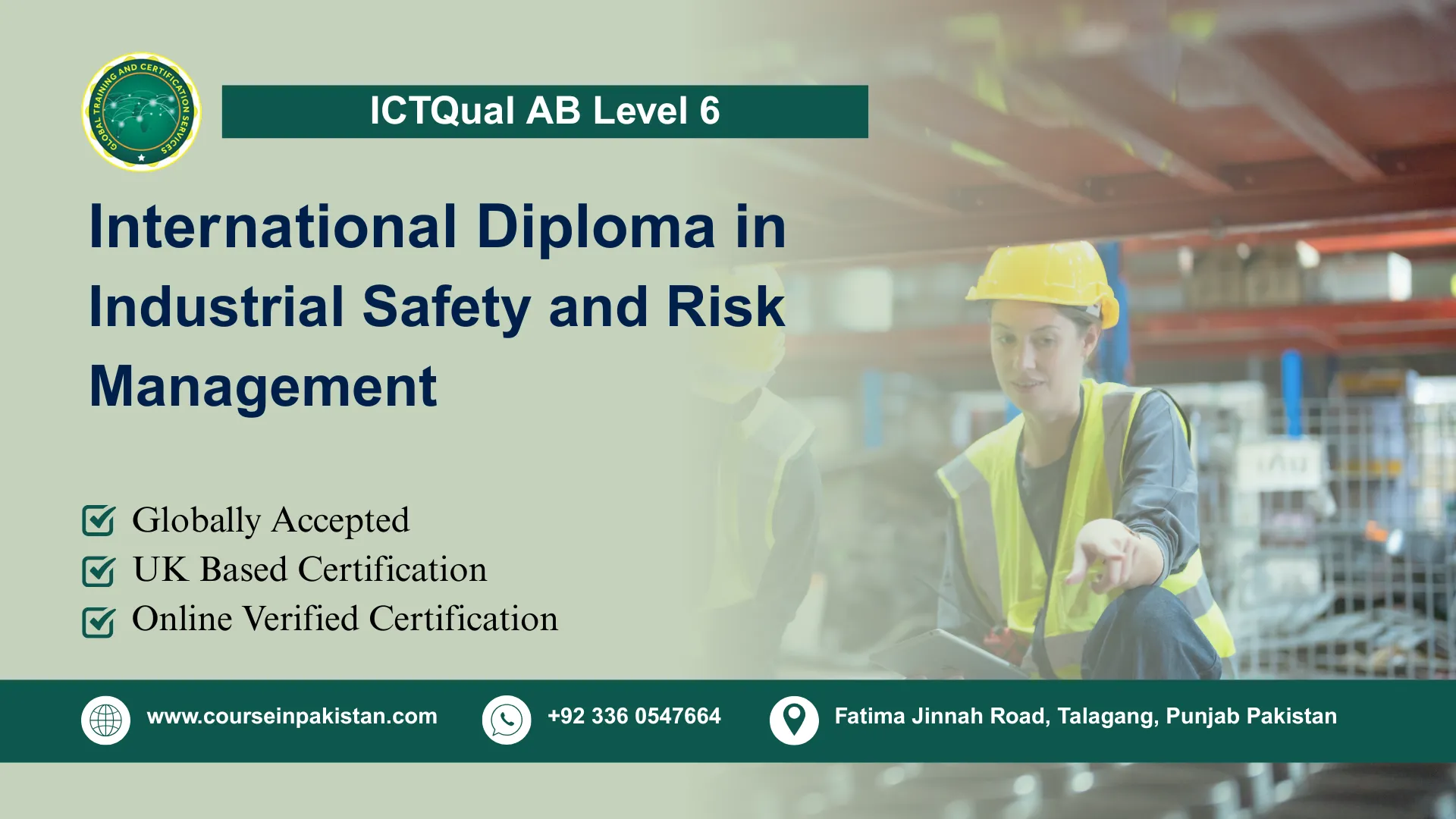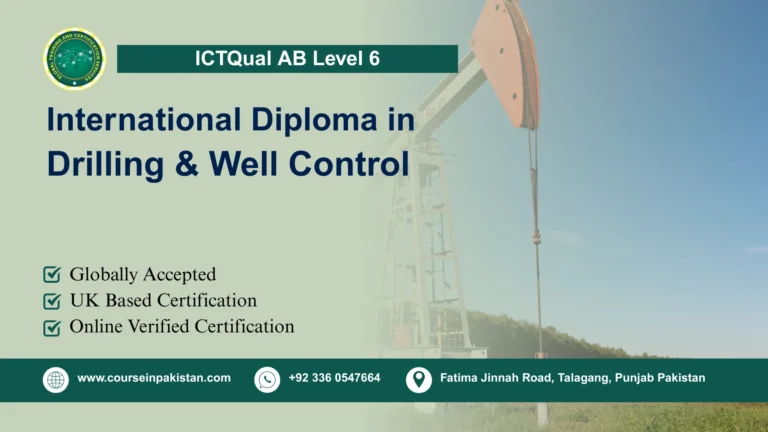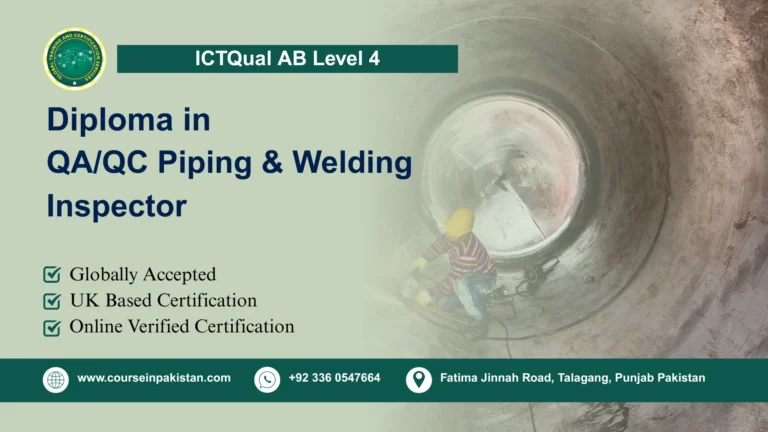
The ICTQual AB Level 6 International Diploma in Industrial Safety and Risk Management is a globally recognized qualification designed to equip learners with advanced knowledge and practical skills in industrial safety, risk assessment, and emergency management. The course emphasizes the integration of safety management principles with operational and strategic practices, enabling learners to identify, analyze, and mitigate risks in various industrial settings. Learners will gain expertise in areas such as hazard identification, workplace safety, regulatory compliance, risk management frameworks, crisis management, and safety leadership.
This program combines theoretical understanding with practical application, preparing learners to develop and implement comprehensive safety strategies, conduct risk assessments, and manage emergency situations effectively. Graduates will acquire strong analytical, problem-solving, and leadership skills, empowering them to take on senior roles in industrial safety, occupational health, and risk management across industries globally.
Course Overview
The ICTQual AB Level 6 International Diploma in Industrial Safety and Risk Management is a globally recognized qualification designed to equip learners with advanced knowledge and practical skills in industrial safety, risk assessment, and occupational health management. This 360-credit, fully assignment-based diploma allows learners to study at their own pace from anywhere in the world. It is British Council verificable and MOFA and Embassy attestable, making it highly suitable for employment, career advancement, and iqama approval. The course covers essential topics such as hazard identification, risk assessment frameworks, safety management systems, crisis and emergency response, regulatory compliance, and safety leadership, preparing learners to manage and mitigate risks effectively in diverse industrial environments.
This qualification is suitable for both fresh learners and experienced professionals. Fresh students are required to complete all 36 mandatory assignments within three years, while experienced and competent individuals with at least six years of relevant experience can complete the certification in a shorter time by submitting verifiable experience and defending their knowledge in professional discussion meetings with an ICTQual AB approved assessor, without completing all mandatory assignments. By the end of the program, learners will have developed the technical expertise, strategic planning skills, and leadership capabilities required to implement comprehensive safety and risk management programs, ensuring operational efficiency, regulatory compliance, and enhanced career prospects both locally and internationally.
Key Highlights of the Course:
- Fully 360-credit Level 6 diploma, flexible and self-paced study
- British Council verificable and MOFA/Embassy attestable qualification
- Suitable for fresh learners and experienced professionals with accelerated pathways
- Focus on practical industrial safety, risk management, and compliance
- Globally recognized for career advancement and iqama approval
Course Benefits
Career Advancement
- Prepare for managerial and leadership roles in industrial safety and risk management
- Enhance employability in manufacturing, energy, construction, and oil & gas sectors
- Gain recognition for expertise in workplace safety and regulatory compliance
Professional Recognition
- Obtain a British Council verified and MOFA/Embassy attestable qualification
- Validate professional experience and knowledge for career growth and iqama approval
- Strengthen credibility for international safety and risk management roles
Flexible Learning
- Complete the diploma entirely through assignments at your own pace
- Accelerated completion option for experienced professionals
- Study from anywhere in the world without classroom constraints
Practical Skills Development
- Learn to identify hazards, assess risks, and implement safety programs
- Gain expertise in emergency response, occupational health, and crisis management
- Develop problem-solving, leadership, and strategic planning skills
Academic and Professional Pathways
- Foundation for postgraduate studies in Industrial Safety, Risk Management, or Occupational Health
- Advanced certifications in safety engineering, risk assessment, and emergency management
- Opportunities to join global professional networks in industrial safety and risk management
Course Study Units
This qualification, the ICTQual AB Level 6 International Diploma in Industrial Safety & Risk Management , consists of 36 mandatory units.
Year 1 – Foundation of Industrial Safety & Risk Management
- Principles of Industrial Safety Management
- Introduction to Risk Management in Industrial Environments
- Occupational Health and Industrial Hygiene Fundamentals
- Workplace Hazards Identification and Control Measures
- Safety Legislation and Regulatory Compliance
- Fire Safety and Emergency Preparedness
- Manual Handling and Ergonomic Safety
- Communication and Reporting in Safety Management
- Introduction to Environmental Safety and Sustainability
- Electrical and Mechanical Safety Awareness
- Incident Investigation and Root Cause Analysis
- Professional Ethics and Responsibility in Safety Practice
Year 2 – Applied Industrial Safety & Risk Management
- Advanced Risk Assessment and Hazard Control
- Safety Performance Monitoring and Auditing
- Process Safety Management and Hazardous Substances
- Industrial Safety in Manufacturing and Heavy Industries
- Safety Management in Construction and Energy Sectors
- Occupational Diseases and Preventive Measures
- Behavioural Safety and Human Factors
- Safety Culture Development and Change Management
- Safety Technology and Digital Tools
- Emergency Response Planning and Crisis Management
- Legal and Regulatory Frameworks (International Perspective)
- Research Methods and Data Analysis for Safety Management
Year 3 – Strategic Leadership in Industrial Safety & Risk Management
- Strategic Safety Leadership and Governance
- Integrated Management Systems (ISO 45001, ISO 14001, ISO 9001)
- Business Risk Management and Sustainability
- Advanced Occupational Health & Wellbeing Strategies
- Safety in Large-Scale Industrial Projects
- Corporate Social Responsibility and Ethical Safety Practices
- International Standards and Global Safety Frameworks
- Digital Transformation and Emerging Trends in Safety
- Policy Development and Implementation in Safety Management
- Research Project / Dissertation in Industrial Safety
- Professional Development and Lifelong Learning
- Capstone Project: Practical Application of Safety Leadership
Learning Outcomes
Year 1 – Foundation of Industrial Safety & Risk Management
Principles of Industrial Safety Management
- Understand fundamental principles of industrial safety
- Apply safety management concepts in workplace environments
- Evaluate the effectiveness of safety interventions
Introduction to Risk Management in Industrial Environments
- Comprehend risk assessment frameworks and methodologies
- Identify potential hazards and assess associated risks
- Develop basic risk mitigation strategies
Occupational Health and Industrial Hygiene Fundamentals
- Understand occupational health principles and hygiene practices
- Apply strategies to prevent workplace illnesses and hazards
- Evaluate the impact of industrial operations on worker health
Workplace Hazards Identification and Control Measures
- Identify common workplace hazards across industries
- Apply control measures to minimize risks
- Evaluate the effectiveness of hazard prevention techniques
Safety Legislation and Regulatory Compliance
- Understand national and international safety laws and regulations
- Apply legal requirements to ensure compliance in industrial settings
- Evaluate the impact of legislation on safety management practices
Fire Safety and Emergency Preparedness
- Understand fire risks and emergency procedures
- Implement fire safety plans and emergency preparedness measures
- Evaluate emergency response effectiveness
Manual Handling and Ergonomic Safety
- Understand ergonomic principles and manual handling risks
- Apply safe handling techniques and ergonomic practices
- Assess workplace ergonomics to reduce injury risks
Communication and Reporting in Safety Management
- Develop effective communication strategies for safety programs
- Prepare safety reports and documentation for stakeholders
- Evaluate the effectiveness of safety communication
Introduction to Environmental Safety and Sustainability
- Understand environmental risks associated with industrial operations
- Apply sustainable practices in safety management
- Evaluate environmental compliance in workplace operations
Electrical and Mechanical Safety Awareness
- Identify electrical and mechanical hazards in the workplace
- Apply preventive and protective measures
- Evaluate safety protocols for equipment and machinery
Incident Investigation and Root Cause Analysis
- Conduct investigations of workplace incidents
- Identify root causes and contributing factors
- Develop corrective and preventive action plans
Professional Ethics and Responsibility in Safety Practice
- Understand ethical principles in industrial safety
- Apply professional responsibility in safety management
- Evaluate ethical dilemmas and solutions in industrial safety practice
Year 2 – Applied Industrial Safety & Risk Management
Advanced Risk Assessment and Hazard Control
- Conduct comprehensive risk assessments in complex environments
- Develop and implement hazard control strategies
- Evaluate effectiveness of risk mitigation measures
Safety Performance Monitoring and Auditing
- Monitor safety performance indicators
- Conduct safety audits and inspections
- Evaluate audit outcomes and recommend improvements
Process Safety Management and Hazardous Substances
- Understand process safety principles and hazardous substance management
- Apply control measures to prevent industrial accidents
- Evaluate compliance with process safety standards
Industrial Safety in Manufacturing and Heavy Industries
- Identify safety challenges in manufacturing and heavy industries
- Apply safety protocols and best practices
- Evaluate operational safety performance
Safety Management in Construction and Energy Sectors
- Understand sector-specific safety requirements
- Implement safety management strategies in construction and energy operations
- Evaluate effectiveness of sector-specific safety practices
Occupational Diseases and Preventive Measures
- Identify common occupational diseases
- Apply preventive strategies to protect worker health
- Evaluate health monitoring and intervention effectiveness
Behavioural Safety and Human Factors
- Understand human factors influencing workplace safety
- Develop behavioural safety programs
- Evaluate the impact of human behaviour on safety performance
Safety Culture Development and Change Management
- Promote a positive safety culture within organizations
- Apply change management strategies to improve safety outcomes
- Evaluate effectiveness of safety culture initiatives
Safety Technology and Digital Tools
- Utilize digital tools for safety management and monitoring
- Apply emerging technologies in industrial safety practices
- Evaluate technology integration for enhanced safety performance
Emergency Response Planning and Crisis Management
- Develop emergency response and crisis management plans
- Implement procedures during industrial emergencies
- Evaluate emergency preparedness and response effectiveness
Legal and Regulatory Frameworks (International Perspective)
- Understand global safety standards and regulations
- Apply international frameworks in workplace safety management
- Evaluate organizational compliance with global safety standards
Research Methods and Data Analysis for Safety Management
- Apply research methodologies to industrial safety projects
- Collect and analyze data to inform safety strategies
- Evaluate research outcomes for continuous improvement
Year 3 – Strategic Leadership in Industrial Safety & Risk Management
Strategic Safety Leadership and Governance
- Develop strategic plans for industrial safety management
- Apply governance principles to ensure compliance and accountability
- Evaluate effectiveness of safety leadership strategies
Integrated Management Systems (ISO 45001, ISO 14001, ISO 9001)
- Understand international management system standards
- Implement integrated safety, environmental, and quality management systems
- Evaluate system effectiveness for organizational improvement
Business Risk Management and Sustainability
- Apply risk management strategies at organizational level
- Integrate sustainability into industrial safety planning
- Evaluate the long-term impact of risk management initiatives
Advanced Occupational Health & Wellbeing Strategies
- Develop strategies to enhance workforce health and wellbeing
- Apply preventive measures to reduce workplace injuries and illnesses
- Evaluate outcomes of occupational health programs
Safety in Large-Scale Industrial Projects
- Identify and manage risks in large-scale industrial operations
- Apply safety planning, monitoring, and control techniques
- Evaluate safety performance and compliance
Corporate Social Responsibility and Ethical Safety Practices
- Integrate CSR principles into safety management
- Apply ethical practices in decision-making and safety programs
- Evaluate organizational adherence to ethical safety standards
International Standards and Global Safety Frameworks
- Understand global safety standards and industry best practices
- Implement international safety frameworks in organizational operations
- Evaluate compliance and benchmarking against global standards
Digital Transformation and Emerging Trends in Safety
- Utilize digital technologies to improve industrial safety performance
- Apply emerging trends and innovations in safety management
- Evaluate technology adoption for operational efficiency
Policy Development and Implementation in Safety Management
- Develop and implement safety policies at organizational level
- Apply policies to guide safe operations and compliance
- Evaluate effectiveness of policy implementation
Research Project / Dissertation in Industrial Safety
- Conduct in-depth research on a relevant safety topic
- Apply analytical and research skills to solve real-world problems
- Present findings with actionable recommendations
Professional Development and Lifelong Learning
- Develop strategies for continuous professional growth
- Apply learning to enhance industrial safety practice
- Evaluate professional development outcomes
Capstone Project: Practical Application of Safety Leadership
- Integrate knowledge from all units into a practical project
- Plan, implement, and evaluate a comprehensive industrial safety initiative
- Demonstrate leadership, technical expertise, and strategic decision-making
Who is This Course For?
Aspiring Safety Professionals
- Individuals seeking a career in industrial safety, risk management, and occupational health
- Fresh graduates aiming to gain advanced knowledge and globally recognized certification
Experienced Practitioners
- Professionals working in manufacturing, energy, construction, or heavy industries
- Individuals seeking accelerated certification based on relevant experience and professional discussion assessments
Self-Motivated and Flexible Learners
- Learners capable of completing assignment-based study at their own pace
- Individuals who prefer online learning from any location globally
Future Leaders and Strategists
- Learners aspiring to take on leadership roles in safety management and compliance
- Professionals looking to implement strategic safety policies and lead crisis management initiatives
Globally Oriented Professionals
- Individuals aiming for British Council verified and MOFA/Embassy attestable qualification
- Professionals seeking career advancement and iqama approval in local and international markets
Future Progression
- Leadership and managerial roles in industrial safety, risk management, and occupational health
- Strategic positions in manufacturing, energy, oil & gas, and construction sectors
- Specialist roles in hazard analysis, safety audits, and emergency response management
- Opportunities to lead corporate social responsibility (CSR) and sustainability initiatives
- Career advancement in consultancy, safety compliance, and training sectors
Academic Pathways:
- Progression to postgraduate studies in Industrial Safety, Occupational Health, or Risk Management
- Advanced certifications in safety engineering, emergency management, or process safety
- Specialization programs in human factors, safety culture development, or digital safety technologies
- Opportunities to join international professional safety networks for career growth
Conclusion
The ICTQual AB Level 6 International Diploma in Industrial Safety & Risk Management is a flexible, globally recognized qualification designed for both fresh learners and experienced professionals. With 36 mandatory units and 360 credits, the course equips learners with advanced skills in industrial safety, risk assessment, crisis management, and leadership. Fresh students complete all assignments within three years, while experienced professionals with relevant experience can earn the diploma in a shorter time through professional discussion assessments. Verified by the British Council and attestable by MOFA and Embassy, this diploma prepares learners to implement safety programs, ensure regulatory compliance, and lead industrial risk management initiatives, enhancing career prospects and professional recognition globally.






